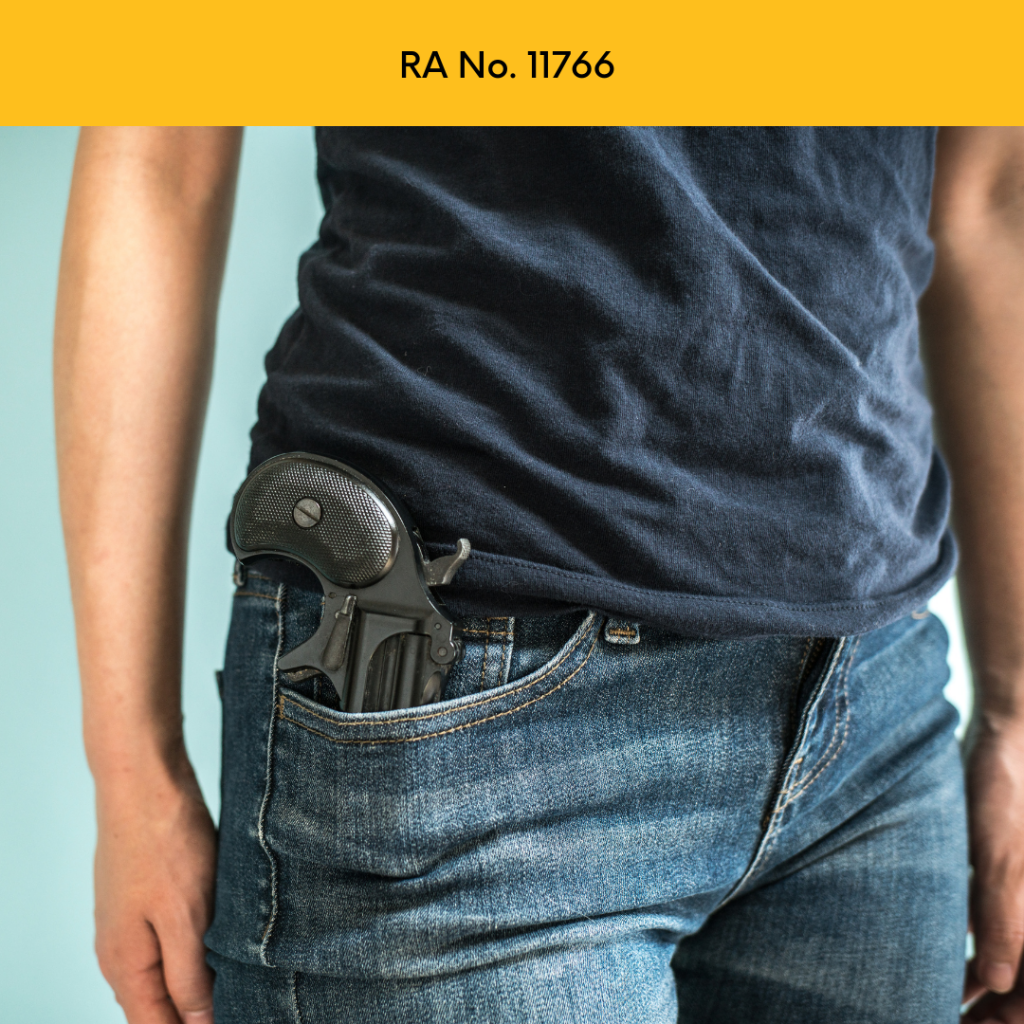
Published 10 February 2023, The Daily Tribune
While it is the policy of the State to maintain peace and order and to protect the people against violence, the State also recognizes the right of its qualified citizens to self-defense through the use of firearms in cases where it will serve as the reasonable means to repel unlawful aggression under the circumstances.
Republic Act 11766 and its Implementing Rules and Regulations were passed to fix the validity period of the registration, license to own and possess, and permit to carry firearms outside of residence or place of business. This law amended Republic Act 10591 or the Comprehensive Firearms and Ammunition Regulation Act of 2013.
Based on Republic Act 11766, the renewal period for both the (1) licenses to possess a firearm, regardless of type or classification, and (2) registration of firearm(s) shall now be every five years or ten years, the option of the licensee, reckoned from the birthdate of the said licensee, unless sooner revoked or suspended. The application for renewal of the license or registration may be submitted to the Firearms and Explosive Office, Regional Civil Security Units, or Civil Security Group One-Stop Shop of the Philippine National Police within six months before the date of the expiration of such license or registration.
Under the IRR, the licensee may synchronize the validity of his firearm(s) registration with the validity of his license to own and possess firearm(s). It must be noted that the 10-year validity shall only be granted if the licensee is in good standing and shall execute an Affidavit of Undertaking to submit a Neuro-Psychiatric Clearance and Drug Test Result when required by the PNP and the failure to submit the same shall cause the revocation or suspension of his license.
In case of failure to renew the license on or before the aforesaid periods, the license to possess and the firearm registration(s) shall both be automatically revoked. On the other hand, in case of failure to renew the firearm registration(s) on or before the aforesaid periods, the firearm registration(s) shall be automatically revoked and the same shall be confiscated or forfeited in favor of the government after due process.
It was likewise noted that the failure to renew a license or registration within the periods stated above on two occasions shall cause the perpetual disqualification of the holder of the firearm from applying for any firearm license.
Furthermore, it must be emphasized that there must be a separate permit for the licensee to carry his firearms outside of his residence or place of business (Permit to Carry). The Permit to Carry, based on the new law, shall be valid for two years from the date of the approval of the application unless sooner revoked or suspended. The Permit to Carry shall be issued by the PNP Chief or his duly authorized representative to any qualified person whose life is under actual threat or is in imminent danger due to the nature of the person’s profession, occupation, or business.
The applicant has the burden to prove the actual threat to his life by submitting a threat assessment certificate, which shall be issued by the appropriate PNP unit within 15 calendar days upon receipt of complete requirements. Nonetheless, the new law added (1) elected incumbent and former officials, and (2) active and retired military and law enforcement personnel among the persons who are exempted from the requirement of a threat assessment certificate.
Below is the current list of persons considered by the Comprehensive Firearms and Ammunition Regulation Act, as amended, to be in imminent danger due to the nature of their profession, occupation, or business, and hence, are exempted from the requirement of a threat assessment certificate:
(1) Members of the Philippine Bar;
(2) Certified Public Accountants;
(3) Accredited Media Practitioners;
(4) Cashiers, Bank Tellers;
(5) Priests, Ministers, Rabbis, Imams;
(6) Physicians and Nurses;
(7) Engineers;
(8) Businessmen who, by the nature of their business or undertaking, are exposed to high risk of being targets of criminal elements;
(9) Elected incumbent and former officials; and
(10) Active and retired military and law enforcement personnel.
Lastly, it must be highlighted that per the IRR, during the validity of the Permit to Carry, a reassessment or revalidation may be conducted by the PNP, either motu proprio or upon receipt of information as validated by any PNP Intelligence Unit, to determine the existence or absence of threat to the holder of the Permit to Carry. Thus, the State indeed balances the right of the licensee to self-defense versus the right of the rest of the people to peace and order.
For more of Dean Nilo Divina’s legal tidbits, please visit www.divinalaw.com. For comments and questions, please send an email to cabdo@divinalaw.com.

